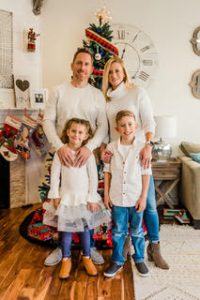Opus Genetics Launch Brings Cautious Optimism For RDH12 Families
Allison Galloway feels cautiously excited about a new genetics company prioritizing research into her children’s form of Leber congenital amaurosis known as LCA13 (RDH12).
“I would say I’m excited, but I don’t put all my eggs in one basket,” the Colorado mother said of the news to bring a treatment closer to market. Her children, Logan and Zoe, both live with LCA13.
“Many times, we think we made progress and then we had some studies done and invested money, and the researcher never progressed with the research.”
Now, a new gene therapy company called Opus Genetics plans to target two forms of LCA. The company’s research into LCA13 will focus on restoring protein expression and halting functional deterioration in patients with retinal dystrophy caused by mutations in the retinal dehydrogenase gene RDH12. LCA13 affects one in 288,000 people. Opus also will concentrate on research into LCA5, which encodes the lebercilin protein and affects about one in 1.7 million people.
The Retinal Degeneration Fund (RD Fund) of the Foundation Fighting Blindness led the $19 million in seed financing for Opus, based in Raleigh, N.C.
Motivated Parents
Opus comes amid efforts by the Galloways and a network of motivated parents to raise money, invest in research, and advocate for genetic testing to help drive studies forward to find a treatment for LCA13.
Allison, a nurse practitioner and founder of a women’s health practice, and her husband, Michael, a VP of Finance, are part of a non-profit that parents of LCA13 patients founded more than 11 years ago called RDH12 Fund for Sight.
“We work with scientists around the world to fund research. We support each other even if we live in the U.S., Italy, Australia, or Saudi Arabia. We try to advocate the importance of all children diagnosed with a rare disease to get genetic testing. Without it, we would have never known what our children had, let alone how to cure it.”
A mutation in the RDH12 gene means an inability for the body to create a simple enzyme called retinal dehydrogenase, which helps in the cleaning and health of the eyes. LCA13 is an autosomal recessive gene defect that appears when each parent has a mutation on the same gene in the same place.
Doctors genetically diagnosed Logan at age 3. Now 10, he is a fifth grader who loves everything technology. Logan loves to ski and is fluent in braille. While his vision is fairly stable, he lost some of his field of vision over the years and his night blindness is severe, his mom said.
When Logan was 5 and Zoe was 3, one day at dinner, Allison noticed her daughter’s eye started to

Michael and Allison Galloway with their kids, Zoe and Logan. Both children have low vision due to LCA13, involving the RDH12 gene.
bounce from side to side.
“I immediately knew what it meant,” she said. “A nystagmus means that the eye is weak and sick. I didn’t need the gene results to know that not only did my son have LCA, but my beautiful little girl did too. A 6 percent chance.”
Doctors genetically diagnosed Zoe also at age 3. Now 8, she is a third grader who loves painting, clay modeling, reading, writing, and riding horses. Her vision is much better than Logan’s, and while it has also been fairly stable, she has lost some over the years.
RDH12 Natural History Study
The children took part in an RDH12 Natural History study by Drs. Tomas S. Aleman, Katherine E. Uyhazi, and Jean Bennett, among a host of other researchers, at the Perelman Center for Advanced Medicine at the University of Pennsylvania.
Logan and Zoe were among 21 patients, ages 2 to 17 years old, from 14 families, who underwent exams, imaging, and numerous studies to track details about the gene’s structure and function, and the progression of the disease across a range of patients with the RDH12 mutation. Natural History studies often serve as a critical part in designing clinical trials eventually involving testing on humans.
The journal Retina published results of this segment of the study in an article titled “RDH12 Mutations Cause a Severe Retinal Degeneration with Relatively Spared Rod Function.”
Allison and Michael attended Hope in Focus’ 2019 LCA Family Conference in Philadelphia, where panels of researchers, including Drs. Aleman and Bennett, shared their study results among an audience of patients, care givers, advocates, scientists, and leaders in biotechnology and the regulatory process.
The Galloways and others in the RDH12 group have been disappointed in the past. In one instance, a biotechnology company announced they were moving forward with RDH12 trials.
“Nothing happened. We’re emotionally battered, so we tend to have a little reluctance until it’s actually occurring.”
Regarding Opus’s plans to drive LCA13 research forward to a viable treatment, Allison said, “While we’re excited, we can’t get all our hopes up. As a board member of the RDH12 Fund for Sight, we have other coals in the fire to keep the research going if this doesn’t progress. But we are hopeful that this is our time, and this study is an answer to our hopes and dreams.
“We’re trying to be part of this study financially because we owe it to our kids and affected members to not be left behind like we have in the past,” she said.
“We have fought too hard and for too long to keep watching them lose their sight.”

